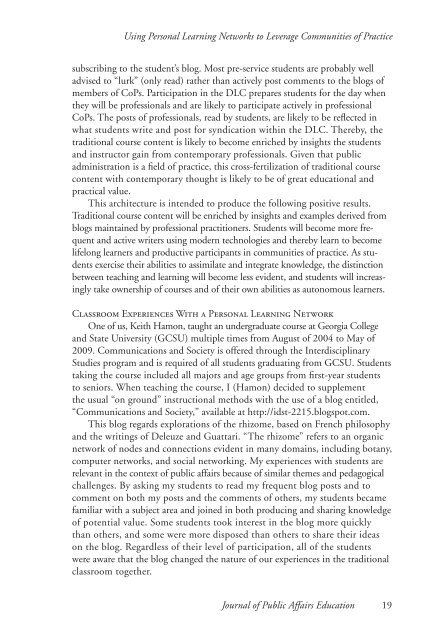Journal of Public Affairs Education
You also want an ePaper? Increase the reach of your titles
YUMPU automatically turns print PDFs into web optimized ePapers that Google loves.
Using Personal Learning Networks to Leverage Communities <strong>of</strong> Practice<br />
subscribing to the student’s blog. Most pre-service students are probably well<br />
advised to “lurk” (only read) rather than actively post comments to the blogs <strong>of</strong><br />
members <strong>of</strong> CoPs. Participation in the DLC prepares students for the day when<br />
they will be pr<strong>of</strong>essionals and are likely to participate actively in pr<strong>of</strong>essional<br />
CoPs. The posts <strong>of</strong> pr<strong>of</strong>essionals, read by students, are likely to be reflected in<br />
what students write and post for syndication within the DLC. Thereby, the<br />
traditional course content is likely to become enriched by insights the students<br />
and instructor gain from contemporary pr<strong>of</strong>essionals. Given that public<br />
administration is a field <strong>of</strong> practice, this cross-fertilization <strong>of</strong> traditional course<br />
content with contemporary thought is likely to be <strong>of</strong> great educational and<br />
practical value.<br />
This architecture is intended to produce the following positive results.<br />
Traditional course content will be enriched by insights and examples derived from<br />
blogs maintained by pr<strong>of</strong>essional practitioners. Students will become more frequent<br />
and active writers using modern technologies and thereby learn to become<br />
lifelong learners and productive participants in communities <strong>of</strong> practice. As students<br />
exercise their abilities to assimilate and integrate knowledge, the distinction<br />
between teaching and learning will become less evident, and students will increasingly<br />
take ownership <strong>of</strong> courses and <strong>of</strong> their own abilities as autonomous learners.<br />
Classroom Experiences With a Personal Learning Network<br />
One <strong>of</strong> us, Keith Hamon, taught an undergraduate course at Georgia College<br />
and State University (GCSU) multiple times from August <strong>of</strong> 2004 to May <strong>of</strong><br />
2009. Communications and Society is <strong>of</strong>fered through the Interdisciplinary<br />
Studies program and is required <strong>of</strong> all students graduating from GCSU. Students<br />
taking the course included all majors and age groups from first-year students<br />
to seniors. When teaching the course, I (Hamon) decided to supplement<br />
the usual “on ground” instructional methods with the use <strong>of</strong> a blog entitled,<br />
“Communications and Society,” available at http://idst-2215.blogspot.com.<br />
This blog regards explorations <strong>of</strong> the rhizome, based on French philosophy<br />
and the writings <strong>of</strong> Deleuze and Guattari. “The rhizome” refers to an organic<br />
network <strong>of</strong> nodes and connections evident in many domains, including botany,<br />
computer networks, and social networking. My experiences with students are<br />
relevant in the context <strong>of</strong> public affairs because <strong>of</strong> similar themes and pedagogical<br />
challenges. By asking my students to read my frequent blog posts and to<br />
comment on both my posts and the comments <strong>of</strong> others, my students became<br />
familiar with a subject area and joined in both producing and sharing knowledge<br />
<strong>of</strong> potential value. Some students took interest in the blog more quickly<br />
than others, and some were more disposed than others to share their ideas<br />
on the blog. Regardless <strong>of</strong> their level <strong>of</strong> participation, all <strong>of</strong> the students<br />
were aware that the blog changed the nature <strong>of</strong> our experiences in the traditional<br />
classroom together.<br />
<strong>Journal</strong> <strong>of</strong> <strong>Public</strong> <strong>Affairs</strong> <strong>Education</strong> 19



